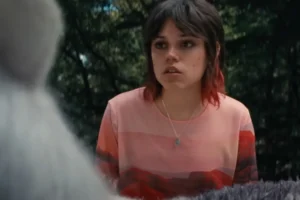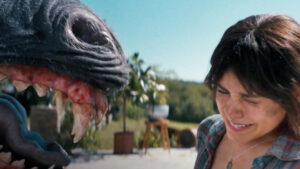Death of a Unicorn (2025) review
Dir. Alex Scharfman
By: Steve Pulaski
Rating: ★★
It’s as if, right before production, Alex Scharfman’s script for Death of a Unicorn was run through some kind of processor — perhaps AI, as that is where creativity is stifled nowadays — that removed all the comedy. So rarely is a film ever-so-close to being funny, but either misses the opportunity at a joke, tiptoes around the punchline, or just chooses to move on unceremoniously to the next bit. It’s quite confounding. This is not a killing of a sacred unicorn.
It also proves to be one of the most fatal flaws of an otherwise original film, which also achieves the immensely difficult feat of being functionally mediocre for a good portion of its runtime and effectively stumble into a rousing, successful ending. Had Death of a Unicorn doubled-down on its simplest desires — showing how the corporate world would instantly harness the magical powers of unicorns for profit through brutal means — instead of doing a lot of unnecessary world-building into the greed-laden culture with which we are all sickeningly familiar, it might’ve found more resonance beyond being a tonally inconsistent satire.

In quite possibly his most unlikable performance yet, Paul Rudd plays Elliot Kintner, a corporate bootlicker headed to his bosses’ estate, located deep in the recesses of thick wilderness. His moody, disinterested daughter is Ridley, played by the chief purveyor of moody and disinterestedness in Jenna Ortega. On the ride to the bosses’, Elliot hits a unicorn of all creatures, and proceeds to smash its brains in with a tire iron. Elliot then decides to throw the presumably dead animal into the trunk of his car, and hustle to meet Odell Leopold (Richard E. Grant), a dying Big Pharma tycoon. The hope is Elliot can broker a deal that will make financially set him and Riley up for the rest of their lives.
At Leopold’s home, accompanied by his wife, Belinda (Téa Leoni), and goofball son Shepard (Will Poulter), the unicorn turns out to be very much alive. After it violently escapes Elliot’s rental car, they shoot the creature dead, and then proceed to examine its properties. Elliot realizes that his once-awful allergies are now obsolete, while Ridley feels a strange connection to the animal, perhaps caused by its sparkly purple blood splattering on them during their initial encounter.
The Leopold ghouls contend that there are healing properties in these animals worth harvesting, which proves problematic when Ridley dives into The Unicorn Tapestries to discover that the animals are actually vengeful beasts when one of their own is harmed at the hands of humans. That makes both of them, the Leopold family, and the family’s two thankless butlers (Anthony Carrigan and Jessica Hynes) targets for the unicorns’ wrath.
There’s a lot of similarities to Jurassic Park running amok, particularly The Lost World, where the commercialization potential of the dinosaur-riddled park is addressed (and those behind it fittingly squashed). The verbosity of the dialog coupled with the neatly manicured interiors of the Leopold estate reminded me of Yorgos Lanthimos. And of course there’s recency bias as play, but the environmentally conscious themes Scharfman looks to evoke by way of kindness to animals echoes the way Bong Joon-ho treated those simultaneously cute yet ugly creepers in Mickey 17.

Scharfman’s satire simultaneously does too much yet not enough in making this concept effective. Again, the jokes are few-and-far-between, and don’t land outside of Poulter’s beefcake entrepreneur making a humorous quip here and there. Far too much time is also spent on Ridley trying to get a moment to cogently explain her findings about unicorns which, while accurate in portraying a plebian trying to seduce rich people with some yuppie, liberal knowledge, leads to stalled clarity for the viewer. Once nightfall hits, and the unicorns begin attacking, the disappointment that most of these kills happen in the dark is palpable. We had to wait so very long to see these oligarchs get their comeuppance, and when that comes, it’s tough to distinguish what exactly is going on. Worst of all, the darkness limits the visible bloodshed.
Death of a Unicorn does manage to entertain when it leans into some of its whimsical, fairytale elements, such as the unicorns’ glowing horns and the absurd acceptance of their candy-colored blood. The cast also seems uniformly on-board with whatever the hell they signed up for, even if Poulter and Ortega are really the only two who shine (Carrigan’s deadpan sighs and eye-rolls are grin-inducing too). The story tries mightily but fails to give Rudd’s Elliot a redemption arc. By the time he realizes that he was a big part of the problem, it’s too late to see him as anything other than a helpless lackey who helped furnish the lavish lives of this awful dynastic family. It all adds up to a baffling mixed bag of ineffective tricks and little resonance. You don’t have to peruse the “eat the rich” genre of filmmaking very long to find gems like The Menu and Parasite strong enough to make Death of a Unicorn‘s shortcomings more abundantly apparent.
Starring: Paul Rudd, Jenna Ortega, Will Poulter, Téa Leoni, Richard E. Grant, Anthony Carrigan, and Jessica Hynes. Directed by: Alex Scharfman.
About Steve Pulaski
Steve Pulaski has been reviewing movies since 2009 for a barrage of different outlets. He graduated North Central College in 2018 and currently works as an on-air radio personality. He also hosts a weekly movie podcast called "Sleepless with Steve," dedicated to film and the film industry, on his YouTube channel. In addition to writing, he's a die-hard Chicago Bears fan and has two cats, appropriately named Siskel and Ebert!


